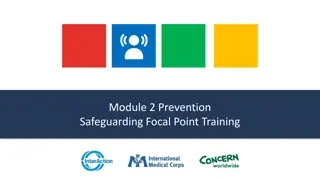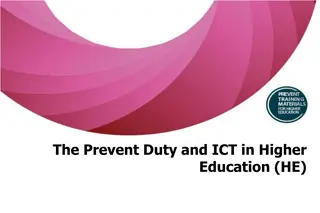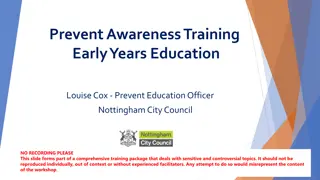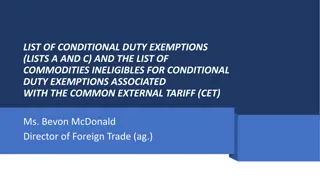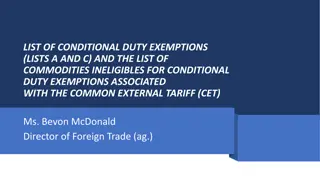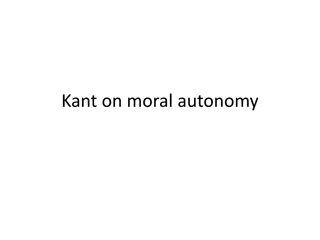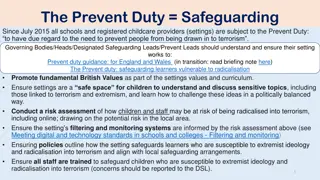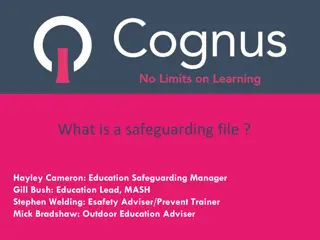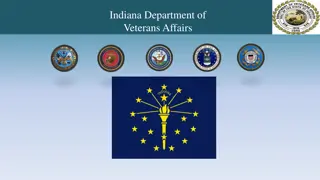Understanding the Prevent Duty in Safeguarding Training at St. Philip Westbrook CEAP
In the Prevent Strategy training session at St. Philip Westbrook CEAP in December 2015, participants were educated on the Prevent duty outlined in the Counter-Terrorism and Security Act 2015. The session aimed to clarify the responsibilities of schools and childcare providers in preventing individuals from being drawn into terrorism. Roles and responsibilities in safeguarding vulnerable individuals, early intervention strategies, and protecting children from radicalization were emphasized throughout the training.
Uploaded on Sep 15, 2024 | 0 Views
Download Presentation

Please find below an Image/Link to download the presentation.
The content on the website is provided AS IS for your information and personal use only. It may not be sold, licensed, or shared on other websites without obtaining consent from the author. Download presentation by click this link. If you encounter any issues during the download, it is possible that the publisher has removed the file from their server.
E N D
Presentation Transcript
Safeguarding Training Prevent Strategy St Philip Westbrook CEAP December 2015
Introduction From 1stJuly 2015 all schools are subject to a duty under section 26 of the Counter-Terrorism and Security Act 2015, in the exercise of their functions, to have due regard to the need to prevent people from being drawn into terrorism . This duty is known as the Prevent duty. It applies to a wide range of public-facing bodies. Bodies to which the duty applies must have regard to statutory guidance. (Paragraphs 57-76 of the guidance are concerned specifically with schools and childcare providers.
Prevent Aims of the session: Explain what the Prevent duty means for schools and childcare providers Make clear what schools and childcare providers should do to demonstrate compliance with the duty; and Inform staff about other sources of information, advice and support Raise awareness of how you can prevent terrorism and violent extremism, both nationally and locally
Roles and responsibilities Help keep communities safe by supporting vulnerable individuals within them Multi-agency approach to support vulnerable individuals at risk of being radicalised Understand action is a safeguarding matter early intervention and pre-criminal Protect children from the risk of radicalisation and take action to protect children from this risk
Prevent duty Prevent duty. The Prevent duty is the duty in the Counter-Terrorism and Security Act 2015 on specified authorities, in the exercise of their functions, to have due regard to the need to prevent people from being drawn into terrorism
The Prevent duty: what it means for schools and childcare providers In order for schools and childcare providers to fulfil the Prevent duty, it is essential that staff are able to identify children who may be vulnerable to radicalisation, and know what to do when they are identified. Protecting children from the risk of radicalisation should be seen as part of the schools and childcare providers wider safeguarding duties, and is similar in nature to protecting children from other harms (e.g. drugs, gangs, neglect, sexual exploitation), whether these come from within their family or are the product of outside influences.
Building resilience Schools can also build resilience to radicalisation by promoting fundamental British values and enabling them to challenge extremist views. It is important to emphasise that the Prevent duty is not intended to stop pupils debating controversial issues. On the contrary, schools should provide a safe space in which children and staff can understand the risks associated with terrorism and develop the knowledge and skills to be able to challenge extremist arguments. For early years providers, the statutory framework for the EYFS sets standards for learning, development and care for children 0-5, thereby assisting their personal, social and emotional development and understanding of the world.
Requirements on schools The statutory guidance on the Prevent duty summarises the requirements on schools in terms of four general themes: risk assessment, working in partnership, staff training and IT policies. Advice focuses on those four themes.
Risk Assessment (cont) General risks may vary from area to area May vary according to age Identify risks within a given local context Understand risk in order to respond in an appropriate and proportionate way Need to be aware of the increased risk of online radicalisation, as terrorist organisations such as ISIL seek to radicalise young people through the use of social media and the internet LA and police can provide contextual info for schools to understand the risk in their areas
Risk Assessment The statutory guidance makes clear that schools are expected to assess the risk of children being drawn into terrorism, including support for extremist ideas that are part of terrorist ideology. This means being able to demonstrate both a general understanding of the risk affecting children and young people in the area and a specific understanding of how to identify individual children who may be at risk and what to do to support them
Identification No single way of identifying an individual who is likely to be susceptible to a terrorist ideology As with managing other safeguarding risks, staff need to be alert to changes in children s behaviour which could indicate that they may be in need of help or protection Children at risk of radicalisation may display different signs or seek to hide their views Use professional judgement in identifying children who may be at risk of radicalisation and act proportionately
Young children Even very young children may be vulnerable to radicalisation by others, whether in the family or outside, and display concerning behaviour. The Prevent duty does not require teachers or childcare providers to carry out unnecessary intrusion into family life but as with other safeguarding risk, they must take action when they observe behaviour of concern
Safeguarding procedures Clear procedures need to be in place to protect children at risk of radicalisation Refer to Working Together to Safeguard Children and Keeping children safe in Education
The Channel Programme Channel is a programme which focuses on providing support at an early stage to people who are identified as being vulnerable to being drawn into terrorism. It provides a mechanism for schools to make a referral if they are concerned about a child or children. An individual s engagement with the programme is entirely voluntary at all stages An online general awareness training module on Channel is available. It support staff to identify factors that can make people vulnerable to radicalisation, and case studies illustrating the types of intervention that may be appropriate, in addition to Channel
Working in Partnership Local Safeguarding Children Board (LSCB) are responsible for co-ordinating what is done by local agencies to safeguard and promote welfare of children LA and police are vital to all aspects of Prevent work. They will provide advice to schools Effective engagement with parents assist and advise families who raise concerns and point them to the right support mechanisms
Staff Training Individuals schools and childcare providers are best placed to assess training needs in the light of their assessment of the risk Minimum requirement Designated Safeguarding Lead undertakes Prevent awareness training and is able to provide advice and support to other staff members of staff on protecting children from the risk of radicalisation As with other online risks of harm, every teacher needs to be aware of the risks posed by the online activity of extremist and terror groups
I.T. Policies Statutory guidance makes clear the need for schools to ensure that children are safe from terrorist and extremist material when accessing the internet in schools. Schools must ensure that suitable filtering is in place. More generally, schools have an important role to play in equipping children to stay safe online, both in school and outside. Internet safety will usually be integral to a school s ICT curriculum and can also be embedded in PSHE and SRE. General advice and resources for schools on internet safety are available on the UK Safer Internet Centre website
Building childrens resilience to radicalisation Provide a safe environment for debating controversial issues and help them to understand how they can influence and participate in decision-making Promote SMSC development and within this fundamental British values PSHE can equip pupils with time to explore sensitive or controversial issues and equip them with the knowledge and skills to understand and manage difficult situations Teach pupils to manage risk, make safer choices, recognise when pressure from others threatens their personal safety and well-being Support them to develop effective ways of resisting pressure from others, including knowing when, where and how to get help Encourage pupils to develop positive character traits through PSHE, such as resilience, determination, self-esteem and confidence
Age appropriateness 4Children, have produced good practice examples demonstrating what promoting fundamental British Values means in the early years. Further advice from the DfE will follow
Types of organisations EDL English Defence League (right wing) Extreme Left Wing Anti-capitalist Domestic animal rights, anti-fracking ISIL
Severe level 700 UK citizens are currently believed to be in war torn countries. They will come back and they will be de-humanised to preservation of human life CONTEST Counter Terrorism Strategy PREVENT only long term solution Protect Prepare Pursue stop terrorist attacks Mitigate the impact of a terrorist attack
Emergency Planning Channel multi-agency approach to support vulnerable individuals at risk of being radicalised They must have some kind of engagement (ideology) They must have Intent and Capability
What should you look for? Change in appearance Change in friendship group
Contact information Merseyside Police Special Branch 0151 777 8311 Msoc.prevent@merseyside.police.uk Call 0800 789 321 to report http://www.merseyside.police.uk/advice-and- protection/terrorism/prevent/ PREVENT Primary school referrals will go to Channel Panel Safeguarding issue / early intervention opportunity. Police will help you to make a referral. twitter@merpolprevent
What to do if you have a concern Follow the normal safeguarding procedures if you have a concern about a particular pupil Discuss concerns with safeguarding lead and where deemed necessary with children s social care. You can contact the local police force by ringing 101. They can help you gain access to support and advice DfE dedicated no. 020 7340 7264 Email counter.extremism@education.gsi.gov.uk NB the above email address is not intended to be used in an emergency situation, such as a child being at risk of immediate harm or a security incident in which case the normal emergency procedures should be followed.


